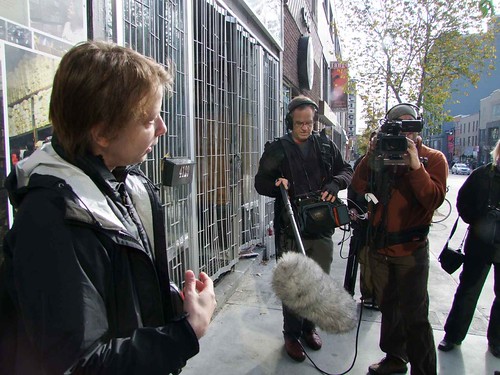
Myself and Simon Bujold (on camera) wearing our techincian hats, filming Annie Roy on St. Lawrence Avenue in Montreal. Photo by Michel Gélinas.
Fellow filmmaker Manfred Becker, director and editor based in Toronto (director of Fatherland, co-director of Diamond Road) recently wrote to me with a question. He was preparing for a workshop he was giving with Barry Stevens (Offspring, The Great Atlantic Air Race) as part of the Documentary Organization of Canada workshop series. He wanted a little input on the following question: ‘We all know that a lot of people feel passionate about making documentaries, but… can you actually make a living doing this?’
Well, a few people can. With budgets in the millions of dollars, Michael Moore is certainly one of them. But for most documentary filmmakers survival is a real struggle. There used to actually be staff jobs for documentary filmmakers at the National Film Board but those positions were mostly abolished about ten years ago. Just a few months ago, the three last remaining NFB staff directors here in Montreal were let go. There are fewer and fewer jobs directing current affairs documentaries at the CBC – that’s where I did my early work. And funding for independent documentaries is more and more precarious, a situation aggravated by the recent Harper government cutbacks in the arts sector. The cuts that affect us filmmakers are the elimination of the Canadian Independent Film and Video Fund and the reduced subsidies for film schools.
Producing a documentary, especially one with a personal style or a socio-political edge, has become extremely difficult. This is why I feel that producers and directors committed to documentary filmmaking are in the same boat, fighting the same battle, and have to be each other’s strongest allies. DOC reflects this essential alliance well, with its membership made up of both directors and producers.
So, back to the question. How do you make a living? My feeling is that the great majority of documentary filmmakers have to either have another job or source of income on the side, or have to wear several hats on their projects. One filmmaker friend in Cape Breton has a small hydroelectric power station on his land, providing basic income. Another one comes from a wealthy family, in addition to being extremely talented. I recommend all of these avenues! But for most of us it is probably more realistic to make money from skills that are related to filmmaking. My friend Martin Duckworth has been teaching film production at Concordia University for years, and so have Daniel Cross and Mary Ellen Davis. Martin of course is a leading DOP, shooting films for other people. Other people do script editing, sound recording or editing. Ironically, you usually make more money working for others (because there is an actual daily rate) than on your own work (unlimited hours, very little pay).
In my own case, I think I only survive because I work in both English and French. If a project doesn’t find takers in one language universe, I can usually finance it in the other. I look for the special producers and commissioning editors who will take on a challenging project. I often invest a lot of money and especially time to get a project to the stage where I can convince producers and investors to get involved. On the side, I teach regularly but not a lot of hours at l’INIS (the Quebec film school) and occasionally elsewhere. I sometimes read scripts for the funding agencies or the National Film Board. But most of all, I wear several hats on my own productions: researcher, writer, production manager, sound recordist, and of course director. I also generally use my own equipment which I rent out to the producer (you noticed, producer is not one of my hats) and which I also rent out to other people when I’m not shooting. My projects generally take about five years from start to finish, so the income is spread pretty thin over those years. I spend far too much money paying interest on my credit line.
This brings us back to the question you asked, about the passion. I don’t think anyone who is not passionate and determined to make documentaries would accept to live with the prevailing, precarious, financial conditions. But of course it’s wonderful work, and it needs to be done.
Thanks to Jorge Bustos-Estefan for help with this blog.
Great post. Can you give us examples of budgets for some of your docs?
Merci Magnus, un mot reste : la passion.
Est-il possible pour les jeunes documentaristes de se batir une carrière dans le domaine, ou de rêver à faire de la télévision documentaire?
Quand l’on voit la tendance actuelle : plus de films, moins de budget. Une distribution beaucoup plus vaste et dans plusieurs médias mais beaucoup moins concentré. C’est à se demander…
Generally for a feature length project involving travel, supported by broadcasters and institutions (funding agencies) a normal budget would be between $ CAN 400.000 and 600.0000. As a director I would get approx 8 % of that, in my case usually spread over about four years. However, with the current funding situation we end up making many of our films on a much reduced budget. Of course, a shorter film or one shot locally can be much cheaper.